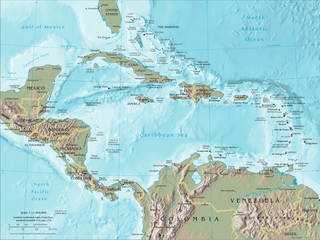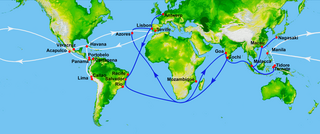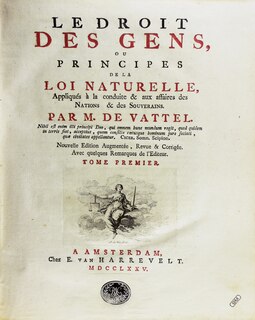Related Research Articles

The Quasi-War was an undeclared naval war fought from 1798 to 1800 between the United States and the French First Republic, primarily in the Caribbean and off the East Coast of the United States. The ability of Congress to authorize military action without a formal declaration of war was later confirmed by the Supreme Court and formed the basis of many similar actions since, including American participation in the Vietnam War and the 1991 Gulf War.

A privateer is a private person or ship that engages in maritime warfare under a commission of war. Since robbery under arms was a common aspect of seaborne trade, until the early 19th century all merchant ships carried arms. A sovereign or delegated authority issued commissions, also referred to as a letter of marque, during wartime. The commission empowered the holder to carry on all forms of hostility permissible at sea by the usages of war. This included attacking foreign vessels and taking them as prizes, and taking prize crews as prisoners for exchange. Captured ships were subject to condemnation and sale under prize law, with the proceeds divided by percentage between the privateer's sponsors, shipowners, captains and crew. A percentage share usually went to the issuer of the commission.

The era of piracy in the Caribbean began in the 1500s and phased out in the 1830s after the navies of the nations of Western Europe and North America with colonies in the Caribbean began combating pirates. The period during which pirates were most successful was from the 1660s to 1730s. Piracy flourished in the Caribbean because of the existence of pirate seaports such as Port Royal in Jamaica, Tortuga in Haiti, and Nassau in the Bahamas. Piracy in the Caribbean was part of a larger historical phenomenon of piracy, as it existed close to major trade and exploration routes in almost all the five oceans.

The Continental Blockade, or Continental System, was a large-scale embargo against British trade by Napoleon Bonaparte against the British Empire from 21 November 1806 until 11 April 1814, during the Napoleonic Wars. Napoleon issued the Berlin Decree on 21 November 1806 in response to the naval blockade of the French coasts enacted by the British government on 16 May 1806. The embargo was applied intermittently, ending on 11 April 1814 after Napoleon's first abdication. The blockade did not cause significant economic damage to the British, although British exports to the continent as a proportion of the country’s total trade dropped from 55% to 25% between 1802 and 1806. As Napoleon realized that extensive trade was going through Spain and Russia, he invaded those two countries. His forces were tied down in Spain, in which the Spanish War of Independence occurred simultaneously, and suffered severely in, and ultimately retreated from, Russia in 1812.

The Paris Declaration respecting Maritime Law of 16 April 1856 was an international multilateral treaty agreed to by the warring parties in the Crimean War gathered at the Congress at Paris after the peace treaty of Paris had been signed in March 1856. As an important juridical novelty in international law the treaty for the first time created the possibility for nations that were not involved in the establishment of the agreement and did not sign, to become a party by acceding the declaration afterwards. So did altogether 55 nations, which wouldn't otherwise haven't been possible in such a short period. A big step in the globalisation of international law.

The Spanish treasure fleet, or West Indies Fleet, was a convoy system of sea routes organized by the Spanish Empire from 1566 to 1790, which linked Spain with its territories in the Americas across the Atlantic. The convoys were general purpose cargo fleets used for transporting a wide variety of items, including agricultural goods, lumber, various metal resources such as silver and gold, gems, pearls, spices, sugar, tobacco, silk, and other exotic goods from the overseas territories of the Spanish Empire to the Spanish mainland. Spanish goods such as oil, wine, textiles, books and tools were transported in the opposite direction.
Prize money refers in particular to naval prize money, usually arising in naval warfare, but also in other circumstances. It was a monetary reward paid in accordance with the prize law of a belligerent state to the crew of a ship belonging to the state, either a warship of its navy or a privateer vessel commissioned by the state. Prize money was most frequently awarded for the capture of enemy ships or of cargoes belonging to an enemy in time of war, either arrested in port at the outbreak of war or captured during the war in international waters or other waters not the territorial waters of a neutral state. Goods carried in neutral ships that are classed as contraband, being shipped to enemy-controlled territory and liable to be useful to it for making war, were also liable to be taken as prizes, but non-contraband goods belonging to neutrals were not. Claims for the award of prize money were usually heard in a prize court, which had to adjudicate the claim and condemn the prize before any distribution of cash or goods could be made to the captors.
The Milan Decree was issued on 17 December 1807 by Napoleon I of France to enforce the 1806 Berlin Decree, which had initiated the Continental System, the basis for his plan to defeat the British by waging economic warfare.
These Orders in Council were a series of decrees, in the form of Orders in Council, made by the Privy Council of the United Kingdom in the course of the wars with Napoleonic France which instituted its policy of commercial warfare. The Orders are important for the role they played in shaping the British war effort against France, but they are also significant for the strained relations—and sometimes military conflict—they caused between Great Britain and neutral countries, whose trade was affected by them.
The origins of the War of 1812 (1812-1815), between the United States and the British Empire and its First Nation allies, have been long debated. There were multiple factors that caused the US declaration of war on Britain:

In admiralty law prizes are equipment, vehicles, vessels, and cargo captured during armed conflict. The most common use of prize in this sense is the capture of an enemy ship and her cargo as a prize of war. In the past, the capturing force would commonly be allotted a share of the worth of the captured prize. Nations often granted letters of marque that would entitle private parties to capture enemy property, usually ships. Once the ship was secured on friendly territory, she would be made the subject of a prize case: an in rem proceeding in which the court determined the status of the condemned property and the manner in which the property was to be disposed of.
USS Gallatin was a post-Revolutionary War sailing vessel that the U.S. Department of the Treasury purchased at Norfolk, Virginia, for the United States Revenue-Marine in December 1807. An explosion on board destroyed her in 1813.

The Post Office Packet Service dates to Tudor times and ran until 1823, when the Admiralty assumed control of the service. Originally, the Post Office used packet ships to carry mail packets to and from British embassies, colonies and outposts. The vessels generally also carried bullion, private goods and passengers. The ships were usually lightly armed and relied on speed for their security. However, Britain was at war almost continuously during the 18th and early 19th centuries with the result that packet ships did get involved in naval engagements with enemy warships and privateers, and were occasionally captured.
Lodewijk Count van Bylandt was a Dutch lieutenant-admiral. He gained a certain notoriety in the Affair of Fielding and Bylandt of 1779 and even more in consequence of the refusal of the Dutch navy to put out to sea to combine with the French fleet in Brest in 1783, during the Fourth Anglo-Dutch War, for which refusal many held him responsible. He was court-martialed and exonerated in the first case, and in the second case an inquiry into his conduct was long delayed and eventually quietly abandoned after stadtholder William V had prevailed against the Patriots in 1787. This made his promotion to lieutenant-admiral possible. He died in office as inspector-general and commander of the gunners corps of the navy of the Dutch Republic.
Sir John Sherbooke of Saint John, New Brunswick was originally the American brig New Orleans Packet that HMS Guerriere detained in August 1811 and that was condemned at Saint John. Local merchants purchased her and named her after Sir John Coape Sherbrooke, Governor of Nova Scotia. After the outbreak of the War of 1812 she acquired a letter of marque. An American privateer captured her in October 1813.

The West Indies campaign of 1803–1810 was a series of military contests mainly in the Caribbean spanning the Napoleonic Wars involving European powers Napoleonic France, the Batavian Republic, Spain, the Kingdom of Portugal and the United Kingdom of Great Britain and Ireland. Eventually British naval forces dominated the seas and by 1810 every French, Dutch and Danish colony was firmly under allied control.

The Law of Nations: Or, Principles of the Law of Nature Applied to the Conduct and Affairs of Nations and Sovereigns is a legal treatise on international law by Emerich de Vattel, published in 1758.
The Essex Decision was a ruling made by the English High Court of Admiralty on 22 May 1805 regarding the capture of the American merchant vessel, Essex. The decision called upon the Rule of 1756, which stated that neutral nations in wartime were only permitted to carry goods that they were permitted to carry in peacetime. Essex was ruled to have violated the Rule of 1756. This led to a sharp increase in British seizure of American ships by the same reasoning and was one of the leading causes of the War of 1812.
Kitty was a French vessel taken in prize c. 1810. She became a West Indiaman and then, following a change of ownership, a privateer. She was one of only two British privateers to target slave traders. She captured three off Sierra Leone before one of her targets captured her in 1814, killing her master, enslaving some of her crew, and setting fire to her.
The Seven Years' War (1756-1763) brought great financial burdens on Great Britain, Kingdom of Prussia, Austria, France, and Sweden. The costs of fighting a protracted war on several continents meant Britain's national debt almost doubled from 1756 to 1763, and this financial pressure which Britain tried to alleviate through new taxation in the Thirteen Colonies helped cause the American Revolution.
References
- ↑ Armed Neutralities - International maritime law in the eighteenth century
- ↑ "France: Decrees on Trade 1793-1810."
- ↑ Max Savelle, Empires to Nations: Expansion in America, 1713-1824, p.141 (1974)
- ↑ Schumann and Schweizer, p. 4.
- ↑ London Chronicle, vol. 1, no. 3 (6 Jan. 1757), p. 24b.
- ↑ Schumann and Schweizer, p. 105.
- ↑ Schumann and Schweitzer, p. 105.
- ↑ Infoplease, "War of 1812: Causes of the War."
- ↑ Infoplease, "War of 1812: Causes of the War."
- ↑ Walton and Rockoff, p. 154.
- ↑ Walton and Rockoff, p. 154.